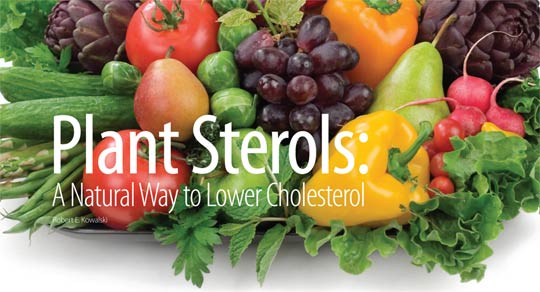
Sterols are a subgroup of the steroids and an important class of organic molecules. They occur naturally in plants, animals, and fungi, with the most familiar type of animal sterol being cholesterol. Cholesterol is vital to cellular function, and a precursor to fat-soluble vitamins and steroid hormones.
Types of sterols
Sterols of plants are called phytosterols and sterols of animals are called zoosterols. Important zoosterols are cholesterol; notable phytosterols include campesterol, sitosterol, and stigmasterol. Ergosterol is a sterol present in the cell membrane of fungi, where it serves a role similar to cholesterol in animal cells.
What are Plant Sterols?
Phytosterols (also called plant sterols) are a group of steroid alcohols, phytochemicals naturally occurring in plants. Phytosterols occur naturally in small quantities in vegetable oils, especially sea buckthorn oil (1640 mg/100g oil), corn oil (968 mg/100g), and soybean oil (327 mg/100g oil). One such phytosterol complex, isolated from vegetable oil, is cholestatin, composed of campesterol, stigmasterol, and brassicasterol, and is marketed as a dietary supplement. They are white powders with mild, characteristic odor, insoluble in water and soluble in alcohols. They have applications in medicine and cosmetics and as a food additive taken to lower cholesterol.
Plant sterols have entered the market as an ingredient in various food products, like, salad dressings, spreads, candies, etc. The popularity of these products is based on some research studies that claim that plant sterols are good for lowering cholesterol levels in humans. Let us take a look at the cholesterol lowering plant sterols.
Cholesterol is a fat-like substance that can be a danger to human health but it is also essential. Cholesterol provides structure for human cells and is a building block for hormones. It is therefore important that people consume some cholesterol. Excessive amounts, however, are connected to problems such as coronary heart disease (CHD).
Many studies that have been conducted over the years indicate that these phytochemicals can help to lower total cholesterol and low density lipoprotein (LDL) cholesterol. The problem with attempting to get benefits from eating them naturally is that plant sterols tend to occur in small amounts in natural sources. It is estimated that, in Western diets, if these phytochemicals are not added to foods, a person may only eat a few hundred milligrams per day. These low levels are not believed to be enough to have an impact on cholesterol absorption.
Plant sterols are therefore often added to foods. This is done by extracting the phytochemicals from natural sources and modifying them so that they can be used for food processes that allow them to be added to other foods. In the European Union, for example, producers of salad dressings, milk, and soya drinks are allowed add plant sterols to their products. Labeling regulations require clear indication that these additives are contained in food items.
In the United States, they can be found in butters, bread, and breakfast cereals. Products that contain added plant sterols can qualify to claim that they help reduce CHD risk. Any products that wish to make the claim must also meet requirements for low saturated fat, low cholesterol, and have less than a specified amount of fat per serving.
Why are plant sterols and stanols important?
Research has shown that plant sterols/stanols included with a heart healthy eating plan may reduce your risk for heart disease. The sterols/stanols work by blocking the absorption of cholesterol in the small intestine. This lowers the low density cholesterol known as the 'bad' cholesterol (LDL ) by 6-15%, without lowering the good cholesterol known as the high density cholesterol ( HDL). Clinical research trials have documented safety and effectiveness for use by the entire family. Plant stanols/sterols do not interfere with cholesterol lowering medications.
Consuming two or more grams daily for more than a month may result in reduced plasma carotenoid levels. There are some indications that these reductions can be prevented by eating five servings of green, yellow, and orange fruits and vegetables which can be packed with carotenoids, an important group of plant pigments. Other health concerns regarding plant sterols include risks of atherosclerosis and plaques that build up and produce heart attacks or strokes.
Regular and light margarines are available, both with only trace amounts of trans fatty acids. In order to achieve the needed 2 grams or more of plant stanols per day, a serving size of 2 to 4 tablespoons per day is needed.
It is important that you eat a variety of foods to get all the nutrients you need. Use the Food Guide Pyramid as an example of the number of servings you should eat from each food group every day. If weight loss is desired, aim to select the lower number of recommended servings, but remember to select from all food groups daily.
Plant Sterols Side Effects
Normally, humans get small amounts of plants sterols from a balanced diet. This is considered to be healthier, as compared to the intake of plant sterols as supplements. Researches are still underway regarding the benefits of plants sterols to lower cholesterol. There are many speculations about the side effects of taking these supplements. Some studies suggest that even though, plants sterols are poorly absorbed, they do enter the bloodstream and can accumulate in the aortic valves, causing stenosis. So, intake of plants sterols supplements is not advisable. It has also been suggested that plants sterols may hinder the body's ability to absorb fat-soluble vitamins and beta carotene. Supplements with plants sterols to lower cholesterol are also not recommended for pregnant ladies, nursing mothers, overweight people and small kids.
![]()
Disclaimer: This website is for information purposes only. By providing the information contained herein we are not diagnosing, treating, curing, mitigating, or preventing any type of disease or medical condition. Before beginning any type of natural, integrative or conventional treatment regime, it is advisible to seek the advice of a licensed healthcare professional.







